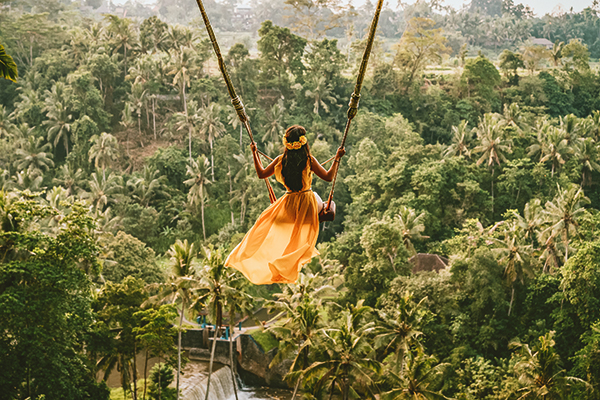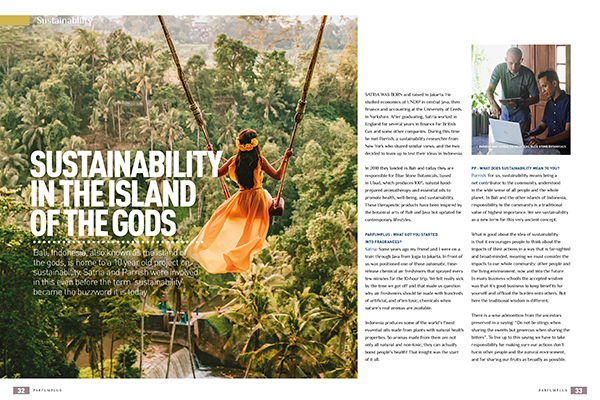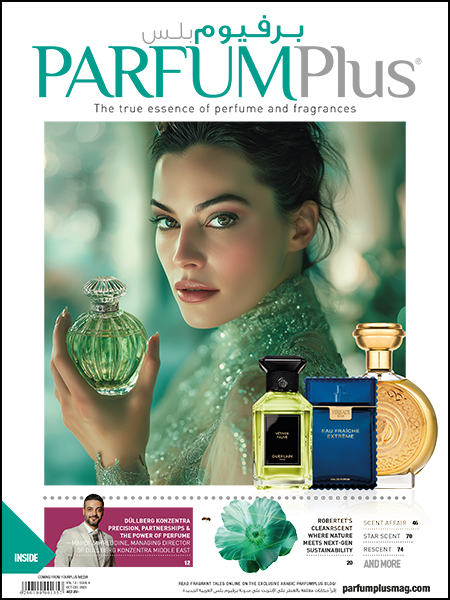Read this post in
 Arabic
Arabic
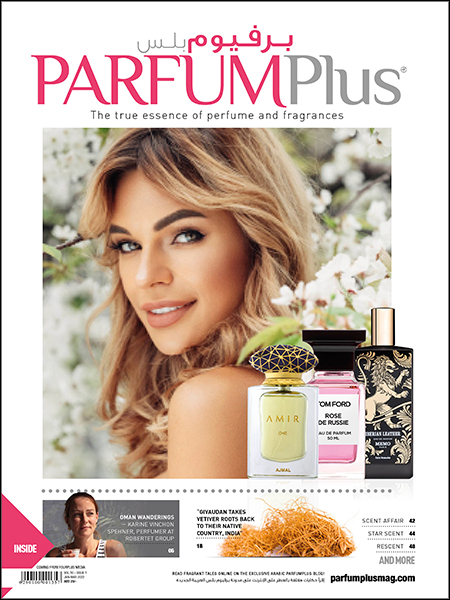
Sustainability In The Island Of The Gods
Bali, Indonesia, also known as the island of the gods, is home to a 10 year old project on sustainability. Satria and Parrish were involved in this even before the term 'sustainability' became the buzzword it is today
Satria was born and raised in Jakarta. He studied economics at UNDIP in central Java, then finance and accounting at the University of Leeds in Yorkshire. After graduating, Satria worked in England for several years in finance for British Gas and some other companies. During this time he met Parrish, a sustainability researcher from New York who shared similar views, and the two decided to team up to test their ideas in Indonesia.
In 2010 they landed in Bali and today they are responsible for Blue Stone Botanicals, based in Ubud, which produces 100% natural hand-prepared aromatherapy and essential oils to promote health, well-being, and sustainability. These therapeutic products have been inspired by the botanical arts of Bali and Java but updated for contemporary lifestyles.
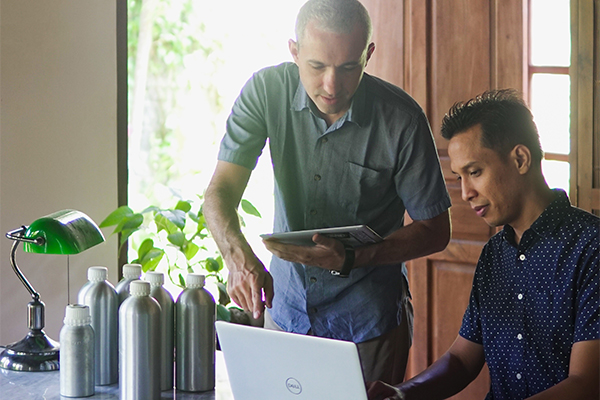
ParfumPlus : What got you startedinto fragrances?
Satria: Some years ago my friend and I were on a train through Java from Jogja to Jakarta. In front of us was positioned one of those automatic, time-release chemical air fresheners that sprayed every few minutes for the 10-hour trip. We felt really sick by the time we got off and that made us question why air fresheners should be made with hundreds of artificial, and often toxic, chemicals when nature’s real aromas are available.
Indonesia produces some of the world’s finest essential oils made from plants with natural health properties. So aromas made from them are not only all natural and non-toxic, they can actually boost people’s health! That insight was the start of it all.
PP : What does sustainability mean to you?
Parrish: For us, sustainability means being a net contributor to the community, understood in the wide sense of all people and the whole planet. In Bali and the other islands of Indonesia, responsibility to the community is a traditional value of highest importance. We see sustainability as a new term for this very ancient concept.
What is good about the idea of sustainability is that it encourages people to think about the impacts of their actions in a way that is far-sighted and broad-minded, meaning we must consider the impacts to our whole community: other people and the living environment, now and into the future. In many business schools the accepted wisdom was that it’s good business to keep benefits for yourself and offload the burden onto others. But here the traditional wisdom is different.
There is a wise admonition from the ancestors preserved in a saying: “Do not be stingy when sharing the sweets but generous when sharing the bitters”. To live up to this saying we have to take responsibility for making sure our actions don’t harm other people and the natural environment, and for sharing our fruits as broadly as possible.
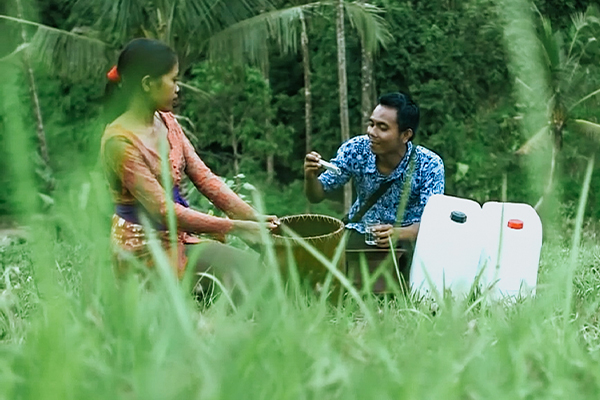
PP : What were your project goals?
Satria: Firstly, we had to figure out how to work around what we didn’t have access to here in Bali and make the most of what we did have. We were fortunate that Indonesia has an abundance of top quality essential oils, and also other oils like virgin coconut and candlenut (kukui). These abundant natural oils (not to mention Bali’s abundant mountain rainwater!) became the special ingredients that enabled Blue Stone Botanicals to find a foothold here in Bali, and then flourish as a market leader in Southeast Asia’s natural products industry.
Parrish: It was pretty challenging in the early days because many necessary ingredients like emulsifiers and thickeners didn’t come in natural alternatives, and if they did they were expensive and not available in Indonesia. So we had to be resourceful and inventive to make the best use of what was available locally to create truly world class products that people would love using and would want to come back for more.
Location is important because some botanicals, like ylang-ylang for instance, need to be distilled within hours of harvest to produce the best essential oils. Also, the ecological conditions—soil type, weather patterns, microclimate, etc.—make a big impact on the qualities of the final oil produced. For example, if you sample lemongrass essential oil made in the eastern part of Java Island versus the western part, the aroma profile is very distinct even though it is the same plant species.
Another example is Indonesian patchouli oil, which is very different from the patchouli most of us are familiar with from India. Patchouli grown in Sumatra Island has a wonderful light, floral aroma, but still with the aromatic persistence characteristic of the Indian patchouli. In the last few years patchouli production has largely shifted to Sulawesi Island, so good quality Sumatran patchouli is getting harder to come by.
PP : How did you go about being 'sustainable'?
Satria: Our first principle is to go all natural. This eliminates all sorts of toxic and polluting synthetic chemicals. But that’s not enough.
Just because a product is natural doesn’t necessarily mean it is beneficial. For example, essential oils, although pure and natural, are very potent and need to be used in safe quantities to ensure health benefits without health risks. Also, some natural ingredients can be very exploitative and environmentally degrading because of the way the industry operates. For example, we do not use palm oil in any of our products out of respect for Indonesia’s disappearing tropical rainforests and indigenous forest inhabitants.
Parrish: It’s not enough just to do less harm. We set out to design diverse benefits directly into our products and business model from the start. Take the example of our Bali Rain Mists. After some time making our all-natural and healthy room freshener we decided to get creative and figure a way for the product to have a more direct, beneficial impact on local communities here in Bali.
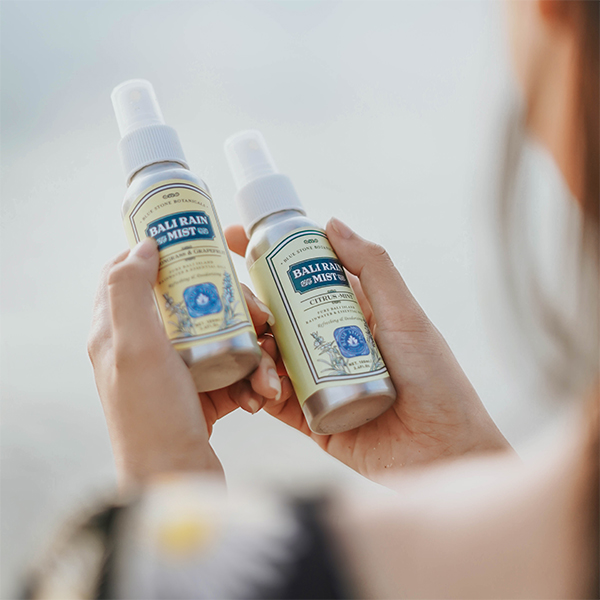
The essential oils already originated from Indonesian farms, but what about all the water we use? That thought inspired a sustainable rural livelihoods project for stay-at-home mothers living on Bali’s rural volcanic mountain slopes. We trained some young mothers how to harvest pure mountain rainwater from their homes, which we buy from them, purify further, then use as a principal ingredient in our Bali Rain Mists. So now we have an air freshener made from pure and natural plant-distilled essential oils in a medium of pure Bali mountain rainwater that supports a network of farmers, distillers, and stay-at-home moms. Good for the community and good for our customers. These are the kinds of products we take great joy in designing and delivering.
PP : Have the goals been achieved?
Satria : Our goals have been achieved, but not completed! We have now been in business for over a decade and we are confident with our product line, business model, and community impact. But we would like to see those impacts grow. To the extent that Blue Stone Botanicals can grow as a business above and beyond Bali, to that same extent our positive impacts for people and planet can grow too. So at the moment we are looking for new investors who share our sustainability commitments and passions to work together to bring Blue Stone Botanicals, with roots firmly planted in Bali, to the wide world above and beyond the island of the gods.
Read this post in
 Arabic
Arabic


